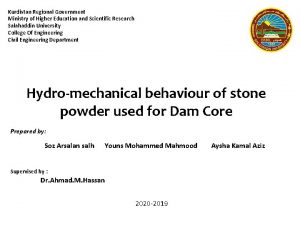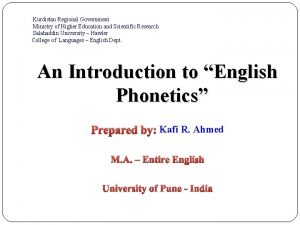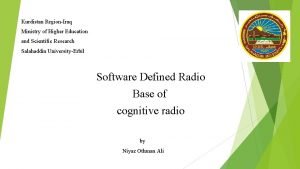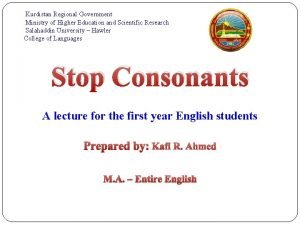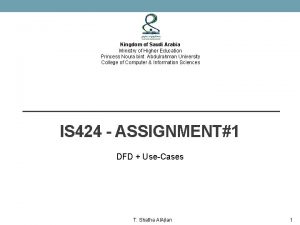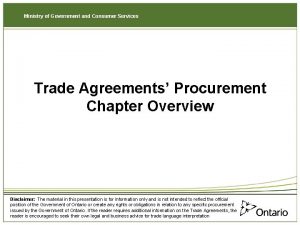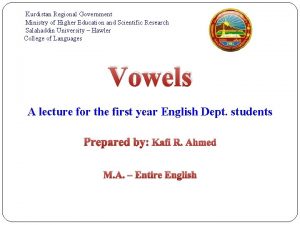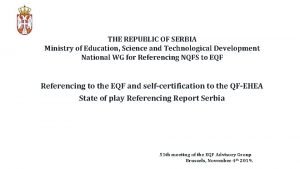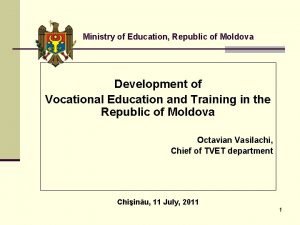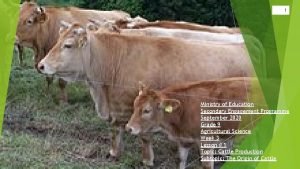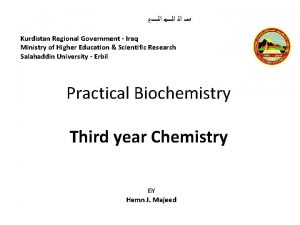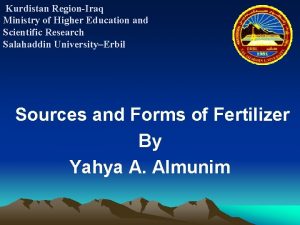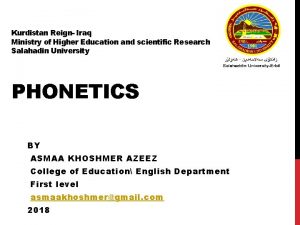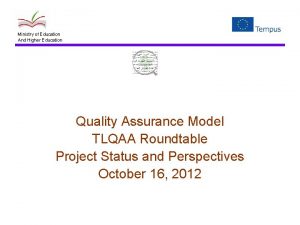Kurdistan Regional Government Ministry of Higher Education and
































- Slides: 32

Kurdistan Regional Government Ministry of Higher Education and Scientific Research Salahaddin University – Hawler College of Languages Stop Consonants A lecture for the first year English students Prepared by: Kafi R. Ahmed M. A. – Entire English


/p/ & /b/ sounds. You can hear them at the: Beginning of the word, like pack & back Middle of the word, like happy & hobby End of the word, like lap & lab Beginning and end of the word, like pop & bob

/t/ & /d/ sounds. You can hear them at the: Beginning of the word, like tie & die Middle of the word, like metal & medal End of the word, like bat & bad Beginning and end of the word, like taught & dad

/k/ & /g/ sounds. You can hear them at the: Beginning of the word, like card & guard Middle of the word, like baker & beggar End of the word, like back & bag Beginning and end of the word, like cake & gig

Voiced = you feel vibration in the vocal cords Voiceless = you don not feel vibration in the vocal cords How? ? ? . Let’s try…. .

Consonants can be classified according to: 1. Place of articulation 2. Manner of articulation Place of articulation means the place where the sound is produced. Manner of articulation means the way that the sound is produced.

Characteristics of /p/, /b/, /t/, /d/, /k/, /g/, /tʃ, &dʒ/ Sounds: /p/ is a bilabial, stop and voiceless consonant sound. /b/ is a bilabial, stop and voiced consonant sound. /t/ is an alveolar, stop and voiceless consonant sound. /d/ is an alveolar, stop and voiced consonant sound. /k/ is a velar, stop and voiceless consonant sound. /g/ is a velar, stop and voiced consonant sound. /tʃ/ is a post-alveolar, stop and voiceless consonant sound /dʒ/ is a post-alveolar, stop and voiced consonant sound

/p/ is made from the following letters: (p) Such as: park, perfect, explain, compose, pump (pp) Such as: supper, happy, suppose, support, opposite (p) is not pronounced in words that contain (ph) except the word shepherd (p) Is not pronounced in the following words psychology, psalm, coup, cupboard, receipt.

/b/ is made from the following letters: (b) Such as: boy, able, bring, above, problem (bb) Such as: rubber, hobby, chubby (b) is not pronounced at the end of the word when preceded by (m) such as: lamb, dumb, comb, thumb, climb, tomb (b) Is not pronounced in the following words plumber, debt, doubt

/t/ is made from the following letters: (t) Such as: time, tea, start, water, sit, hut (tt) Such as: letter, cattle, battle. latter (ght) Such as: right, bought, night, flight Suffix (ed) is pronounced as /t/ when it is preceded by sounds /p, k, f, θ, s, ʃ, ʧ/. Such as: helped, locked, laughed, missed, watched, washed, faced, except wicked (t) Is not pronounced in (tch), such as: catch, watch, switch, fetch. (t) Is not pronounced in the following words: Wrestle, castle, whistle, Christmas, soften, listen, fasten, mustn’t, postpone

/d/ is made from the following letters: (d) Such as: do, day, under, today, bad (dd) Such as: middle, add, ladder, suddenly Suffix (ed) is pronounced as /ɪd/ when it is preceded by sounds /t & d/. Such as: wanted, hated, demanded, added, Suffix (ed) Is pronounced as /d/ when it is preceded by all the vowels and consonant sounds except / p, k, f, θ, s, ʃ, ʧ, t, d/ such as: played, remained, studied (d) Is not pronounced in (edg) group, such as: edge, bridge, judge, budget (d) Is not pronounced in the following words: Handsome, grandmother, adjective, Wednesday

/k/ is made from the following letters: (k) Such as: keep, market, baker, park (ck) Such as: clock, neck, luck, sick, duck, black (q) Such as: queen, quick, quite (ch) Such as: ache, school, mechanic, stomach, character (c) is pronounced as /k/ when it is not followed by (i, e, y). Such as: cash, come, coin, act, cure, cat, action, clear, cry (cc) Such as: accurate, according, occur, accuse (cc) Is pronounced as /ks/ such as: accident, succeed (k) Is not pronounced at the beginning of a word when followed by (n), such as: knight, knee, knock, knife, know (x) When it is not followed by (a), such as: fox, fix, ox, mixed

/g/ is made from the following letters: (g) Such as: game, gold, regret, regard, (gg) Such as: bigger, beggar, dagger, egg (g) Is not pronounced in (ign & ght & gh), such as: knight, right, though, high, weight, through, sign, neighbour, sovereign, design, foreigner, designer, reign, resign, foreign (x) When it is followed by (a), such as: examination, example, exact, exhaust, /g/ is found in words like exist & exhibit

/tʃ/ is made from the following letters: (ch) Such as: cheap, chance, merchant, teacher, church, lunch, choose, rich, munch…. (tch) Such as: switch, watch, catch, butcher, match, kitchen (tu) Such as: picture, capture, adventure, future, century, mixture, furniture, actually, lecture, fortune, situation, statue, congratulation…. (ti) Such as: question, suggestion, indigestion, Christian

/dʒ/ is made from the following letters: (j) Such as: join, just, project, reject, major, job…. (g + e, i, y) Such as: surgery, gentle, village, suggest, religion, origin, engine, age, gypsy, zoology, judge, bridge, fridge…. Except the following words, Such as: (get, girl, give, eager, forget, forgive) (du) Such as: gradually, education, graduate, individually, procedure… /dʒ/ can be found in these two words: (soldier & sandwich)

Friction Consonants There are nine consonants whose main sounds all have friction as their most important feature. They are: /f, v, θ, ð, s, z, ʃ , ʒ, h/

/f/ & /v/ sounds. You can hear them at the: Beginning of the word, like fast & vast Middle of the word, like sofa & over End of the word, like life & live

/θ/ & /ð/ sounds. You can hear them at the: Beginning of the word, like thin & then Middle of the word, like author & mother End of the word, like bath & breathe

/s/ & /z/ sounds. You can hear them at the: Beginning of the word, like said & zed Middle of the word, like racing & raising End of the word, like bus & buzz

/ʃ/ & /ʒ/ sounds. You can hear them at the: Beginning of the word, like shock & genre Middle of the word, like rational & casual End of the word, like bush & rouge

/h/ sound. You can hear them at the: Beginning of the word, like hello, how Middle of the word, like behind, behave It never occurs at the end of the word

Characteristics of /f, v, θ, ð, s, z, ʃ , ʒ, h/ sounds: /f/ is a labio-dental, fricative and voiceless consonant sound. /v/ is a labio-dental, fricative and voiced consonant sound. / θ / is a dental, fricative and voiceless consonant sound. / ð / is a dental, fricative and voiced consonant sound. / s / is an alveolar, fricative and voiceless consonant sound. / z / is an alveolar, fricative and voiced consonant sound. / ʃ / is a post-alveolar, fricative and voiceless consonant sound. / ʒ / is a post-alveolar, fricative and voiced consonant sound. / h / is a glottal, fricative and voiceless consonant sound.

/f/ is made from the following letters: (f) Such as: fox, free, defend, deaf, refuse, roof, fear, etc. (ff) Such as: offer, different, off, coffee, office, etc. (ph) Such as: phone, philosophy, photograph, elephant, etc. (gh) Such as: enough, laugh, draught, rough, cough, tough, laughter, etc.

/v/ is made from the following letters: (v) Such as: very, voice, verse, over, level, advice, move, have, leave, etc. (f) Such as: of

/θ/ is made from the following letters: (th) Such as: thin, thousand, thought, throat, method, wealthy, tooth, teeth, cloth, length, truth, threat, breath, both, healthy, through, throw, thunder, thick, faith, bath, etc.

/ð/ is made from the following letters: (th) Such as: this, those, that, with, either, mother, clothes, they, these, feather, neither, their, brother, etc.

/s/ is made from the following letters: (s) Such as: see, sit, beside, most, gas, bus, slow, etc. (ss) Such as: pass, glass, miss, lesson, essay, class, etc. (x) Contains /s/ when it does not follow by (a) except the word relaxation. Such as: external, extinguish, box, fox, reflex, expansion, etc. (c + i, e, y = /s/) Such as: city, centre, circle, cylinder, etc. Suffix (s) is pronounced as /s/ when preceded by /p, t, k, f, θ/ such as: stops, hopes, cats, looks, roofs, picnics, laughs, months, aches

/z/ is made from the following letters: (z) Such as: zero, zone, zoo, crazy, horizon, freeze, (zz) Such as: puzzle, buzz, (s) Such as: busy, easy, as, is, has, (vowel + s + vowel) Such as: nose, rose, business, those, advise, close, rise, confuse, refuse, houses, thousand. (ss) scissors (x + a) Such as: exam, exact, exhaust, (also in exhibit, exist) (s) is pronounced as /z/ when it is not preceded by /p, t, k, f, θ, s, z, ʃ, ʒ, tʃ, dʒ/ such as: plays, tries, sings, waves, happens (s) Is pronounced as /ɪz/ when preceded by /s, z, ʃ, ʒ, tʃ, dʒ/ Such as: buses, faces, washes, boxes, watches, wages, etc.

/ʃ/ is made from the following letters: (sh) Such as: she, show, bushes, wash, push, shy, fashion… (ch) Such as: machine, parachute…. (su) Such as: sure, ensure, sugar, issue, pressure, tissue…. (si) Such as: impression, confession, expression, passion, expansion, mission, dimension, comprehension. . (ti) Such as: partial, patient, essential, national, emotion…. . (ci) Such as: social, official, artificial, special, crucial, musician /ʃ/ Can be found from the following words: Such as: Ocean, anxious, ancient, conscience, conscious, precious.

/ʒ/ is made from the following letters: (su) Such as: usually, pleasure, measure, leisure, casual, exposure, enclosure, treasure…. (si) Such as: occasion, illusion, explosion, confusion, division, revision, decision, television, conclusion, provision, vision. . . (ge) Such as: garage, prestige, massage….

/h/ is made from the following letters: (h) Such as: he, behind, home, humble, perhaps, hole…. (h) Is not pronounced when it is at the beginning and followed by (o): hour, honest, honourable (h) Is not pronounced in (ght & gh). Such as: high, thigh, neighbour, right, might…. (h) Is not pronounced when it is at the beginning and preceded by (w) Such as: which, what, when, where, why, whisper, whistle. But it is pronounced in the following words, Such as: Who, whom, whose, wholly.
 Kurdistan
Kurdistan Krg ministry of higher education
Krg ministry of higher education Ministry of higher education kurdistan
Ministry of higher education kurdistan Kurdistan
Kurdistan Ministry of higher education afghanistan
Ministry of higher education afghanistan Ministry of higher education saudi arabia
Ministry of higher education saudi arabia Ministry of higher education tunisia
Ministry of higher education tunisia Ministry of higher education saudi arabia
Ministry of higher education saudi arabia Ministry of regional development and public works
Ministry of regional development and public works Ministry of regional development and public works
Ministry of regional development and public works Ministry of government and consumer services
Ministry of government and consumer services Ministry of government and consumer services
Ministry of government and consumer services Kurdistan
Kurdistan Tourism in kurdistan
Tourism in kurdistan Kurdistan
Kurdistan Stateless nation
Stateless nation Ministry of education romania
Ministry of education romania Ministry of education and culture cyprus
Ministry of education and culture cyprus Hellenic ministry of education and religious affairs
Hellenic ministry of education and religious affairs Ministry of education romania
Ministry of education romania Ministry of education and science of the russian federation
Ministry of education and science of the russian federation Ministry of education serbia
Ministry of education serbia Kuwait ministry of education
Kuwait ministry of education Matriculation certificate
Matriculation certificate Ministry of education armenia
Ministry of education armenia Ministry of education mubarak al kabeer
Ministry of education mubarak al kabeer Ministry of education iceland
Ministry of education iceland Ministry of education morocco
Ministry of education morocco Ministry of education
Ministry of education Ministry of education
Ministry of education Ministry of education peru
Ministry of education peru Secondary engagement programme
Secondary engagement programme Ministry of education
Ministry of education
